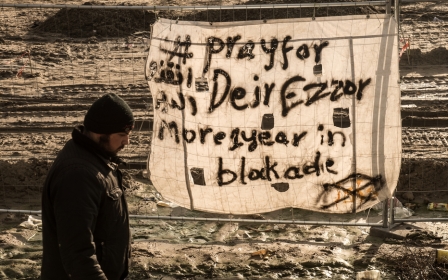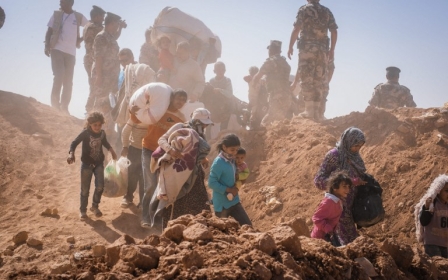Syrian army seizes last rebel-held town in Latakia ahead of peace talks

The last rebel-held town in the coastal Latakia province, one of Syrian President Bashar al-Assad's strongholds, was reported on Sunday to have been captured by government forces.
Syria's SANA state broadcaster said that armed forces backed by local militia groups had taken control of the town of Rabia, which had been held by the opposition since 2012 and was controlled by a range of rebel groups including some made up of Syrian Turkmen as well as the al-Qaeda-affiliated al-Nusra Front.
According to the Syrian Observatory for Human Rights, Rabia fell on Sunday after a steady government advance that left the town surrounded.
"In the past 48 hours, regime forces surrounded the town from three sides - the south, west, and north - by capturing 20 villages," Observatory head Rami Abdel Rahman told AFP.
A Syrian army commander in Latakia told AFP that the army will use Rabia as a launching point for ground operations against other rebel-held towns in the adjacent Idlib province in the east.
"In the coming weeks, we will be able to announce that all of Latakia - city and province - is free from armed groups," he said.
Abdel Rahman said senior Russian military officials were overseeing the battle for Rabia and that Russian air strikes were playing "an essential role" in the fight.
With the capture of Rabia, government troops are closing in on rebel supply routes through the Turkish border to the north, he added.
According to a Syrian analyst, Rabia represents the "crossroads of supply routes in this region" leading northwest towards the Turkish border and further east to other rebel strongholds.
"By controlling this road, the Syrian army can block rebel movements towards the south, towards Latakia, and the rebels will have a hard time getting close and firing missiles at the [coastal] airport," Fabrice Balanche said.
Rabia's fall comes after government troops seized the strategic town of Salma on 12 January, following months of operations to capture it from rebels who had held it since 2012.
Dispute over delegations for Geneva talks
Meanwhile, doubts continue to hang over proposed peace talks between government and opposition representatives that are due to begin in Geneva, Switzerland, on Monday amid disagreements over the future of President Assad and the make-up of the opposition delegation.
On Sunday, German Foreign Minister Frank-Walter Steinmeier said upcoming talks should include Islamist rebels, though not "extremists".
"Where do you expect to find moderate groups after more than five years of civil war, extreme violence and spreading brutalisation?" Steinmeier was quoted as telling the newspaper Frankfurter Allgemeine Sonntagszeitung.
"I'm afraid we are past the point where we can really pick and choose all counterparts and negotiators," Steinmeier said, but he stressed that there is no room for "terrorists and Islamic extremists at the table who only want to sabotage the political solution".
The High Negotiations Committee, a Riyadh-based alliance of mainstream opposition groups including the National Coalition, has already announced three delegates it will send to Geneva.
But it came under fire for naming Mohamed Alloush from the powerful rebel group Jaish al-Islam (Army of Islam) as chief negotiator.
Syria's government regularly refers to Jaish al-Islam and other armed opponents as "terrorists groups" with which it will not negotiate.
US Secretary of State John Kerry, during a visit to Saudi Arabia that included talks with Riad Hijab, the general coordinator of Syria's largest opposition coalition, said he remained confident that the talks would proceed.
"We are confident that with good initiative in the next day or so those talks can get going and that the UN representative special envoy, Staffan De Mistura, will be convening people in an appropriate manner for the proximity talks that will be the first meeting in Geneva," Kerry told reporters.
Stay informed with MEE's newsletters
Sign up to get the latest alerts, insights and analysis, starting with Turkey Unpacked
Middle East Eye delivers independent and unrivalled coverage and analysis of the Middle East, North Africa and beyond. To learn more about republishing this content and the associated fees, please fill out this form. More about MEE can be found here.




